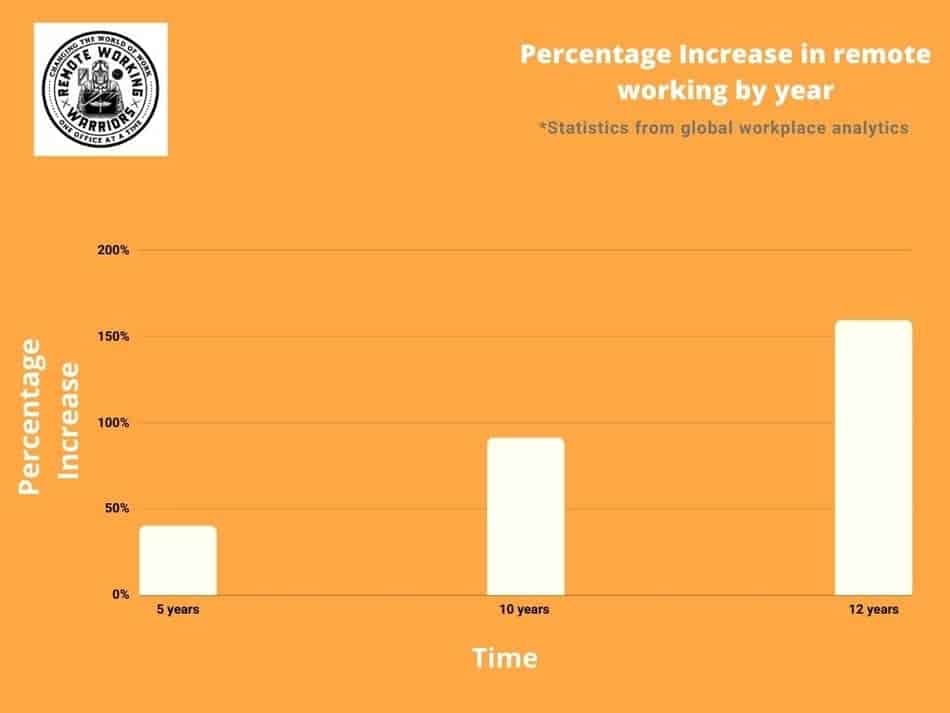This website is supported by its readers. If you click one of my links I may earn a commission. I am also a participant in the Amazon affiliates programme and I will also earn a commission from qualified purchases.

One of the things I struggled with when I first started working from home was the difference between working from home and flexible working. I was unsure of the difference and if I was able to be in charge of my own schedule or not.
Working from home is an agreement between the employer and employee that allows part or some of its workforce to work remotely. Flexible working is an umbrella term used to describe different work patterns such as flexitime or annualised hours and can encompass working from home.
So what are the benefits and drawbacks of both? And should employers really consider these? Keep reading to find out more. Also a lot of people who will be reading this post will be in the process of working remotely so if this is the case with yourself feel free to check out my recommendations here.
What is the different between working from home and flexible working?
So imagine you’ve been called into a meeting with your HR manager. Naturally your anxiety is through the roof. I mean usually we only meet with them for one too many sick days being taken off, or when your role might miraculously be absorbed by someone else.
Now imagine your HR manager turns around and wants your input in developing the new flexible working policy…. Completely different emotions right?
The truth of the matter is that around 3.4% of Americans are currently working remotely, a number that is set to continue to grow with more and more people feeling as though it is the new normal.

Now 63% of people currently work flexibly already….. Hand on a second…aren’t these the same things?
As you can see flexible working and remote working/Working from home have a major gap in between them and although they might not be that apparent on the first glance, It’s important to know the difference.
It’s worth mentioning that in this article we are using the terms working from home and remote working interchangeably. There are some subtle differences but we will cover this later.
To help explain I’ve put together a table below:
|
Difference |
Flexible working |
Working from home/Working remotely |
| Percentage of people doing this already | 63% | 3.4% |
| Definition | Flexible working is a non-traditional work arrangement HR teams set up to take into considerations their employees personal needs such as childcare. It is typically used to describe any alternative to the 9-5. This can encompass everything from working a set number of hours per week, starting later or finishing earlier. | Working from home is a type of flexible working that employers use to allow their employees to work from a home/ a remote space. This can typically be one to two days per week or a full time home based role. |
| Also known as | Flexi-time, flexible hours | Remote working, working for a home office. |
| How long have people been doing this for | Flexible working was introduced in the 1970’s | People used to work remotely/from home since before the industrial revolution |
| Percentage growth over the past few years | 500% over the past 20 years. | 159% in the past 12 years |
| Roles this is suited to |
|
|
| Major difference | The major difference between flexible working and remote working is that flexible working encompasses all elements that are different to the traditional 9-5 including starting later, finishing earlier and making up the hours afterwards. Working remotely and working from home is a type of flexible working that allows employees to work from a different space other than a work office | |
So now that we know a few of the differences between the two, let’s look at some of the FAQs associated with both.
What does working from home mean?
Working from home is a type of flexible working agreement employers have for their employees that enables them to work from a home office space.
What does flexible working mean?
Flexible working is an agreement between an employer and an employee that encompasses anything different to the traditional 9-5 work hours. This can also be known as agile working.
This can cover everything from flexi-hours, working from home. Starting late or working on weekends.
The idea behind it is to help employees with their work life balance and is typically used b y parents to help mitigate childcare.
What does remote working mean?
Remote working is an agreement employers have with their employees that enables them to work outside of a traditional central office space.
What is the difference between working remotely and working from home?
The major difference between working remotely and working from home is the location of work. Whilst most people who work from home work from their residence. Working remotely can mean working in other venues such as coffee shops, or in a different location.
Working remotely can also mean working from home and is something a number of entrepreneurs currently do. Anyone who has watched any entrepreneur video knows that this is often used online with passive income.
Both are typically set up by HR teams to help their employees have a better work life balance, ensuring their employees are both happy and productive without any detriment to the business.
What are the benefits of working from home and flexible working?
Working from home and flexible working both have a number of great advantages including:
- Remote employees are happiest
- Employees for a more productive organisation
- Increases job satisfaction
- Ensures employees are healthier
- Is environmentally friendly
- Employees earn more
- Able to meet their personal needs
- Can work at times when they feel more energised
- Enhances company image as a caring organisation
Let’s break each of these down.
Remote employees are happier
So one of the major benefits of employees who work remotely is the massive increases in happiness.
A study by owl labs back in 2019 found that employees who have the ability to work remotely/ ork from home are 22% happier than their home office counterparts.
The participants stated include, less stress, a better work-life balance and the ability to avoid a commute as the main reasons as to why.
So why is this good for an organisation? Well employees who are happier tend to stay longer and are more productive than employees who are not, meaning a lot of saved costs and time saved in recruiting staff.
Remote employees are more productive
As discussed above employees who work remotely/ from home are much more productive than their office based counterparts. They tend to work on average 16.8 days more than their office based counterparts.
So why is productivity important for organisations? Well research suggests that employees are only productive for about 2 hours and 53 minutes per day so gaining back any productivity will be incredibly useful for any firm.
Remote workers are more satisfied with their jobs
Another huge benefit for remote employees is that they are 51% more likely to be satisfied in their roles than other employees.
Remote workers are also much more likely to stay in their roles with 42% of remote workers having done this for the past 5 years or so.
This is a huge number and is super important as employees that are satisfied are less likely to leave. The average american business spends about $4129 on recruiting employees. In times of crises this can go a long way to improving a company’s cash flow.
Remote workers are healthier
So this might seem counter intuitive because employees are not commuting and might be seen as exercising less than their office based counterparts but remote employees are 56% less likely to take sick days.
On top of this 86% remote working employees feel less stressed when working at home then in an office.
By doing this means organisations can spend less on well being platforms and tools like EAP and gain back any time loss due to stress induced illness.
Remote employees are more environmentally friendly
According to a flex job study, remote workers take about 600,000 cars off the road in the US alone.
If this was expanded to all employees who could work from home that would equate to taking 10 million cars off the road., which would lead to a massive reduction in greenhouse emissions.
Remote based employees earn more
Employees who work remotely earn about $4000 more than their office based counterparts. This is due to the lack of commute as well as other factors such as people who work exclusively from home are more likely to be business owners and such, better off financially.
On top of this, employees who work remotely are much more likely to be earning over $100,000 then their office based counterparts.
Flexible workers are able to meet their family needs
One of the primary reasons that flexible working was first introduced was because of families. Unfortunately with the cost of childcare increasing year on year employees need a better way to balance their work life balance and by having the option for employees will further increase your employees productivity and happiness
Flexible workers can work to their own schedules
Let’s face it, not everyone is a morning person.
We all know that people who get less sleep are much less productive than those of us who manage to get a full 8 hours in.
What you might not know is some of us are geared up to be either early birds or night owls.
By having the option to work flexibly employees now have the option to choose what works for them and work when they are the most productive. Now this might not be suitable to all types of roles for example sales or teaching but it is worth considering.
Enhances company image as a caring organisation
One of the huge benefits of flexible working for employers is that it proves to your workforce that you are a caring organisation.
We’ve all worked in places that are punch the clock, where you feel like a part of the machinery. BY working for an organisation that truly values it;s employees, employees are much more likely to want to work harder and longer., doing what it’s best for the organisation and going the extra mile.
Why should employers consider remote working?
As discussed, employers should consider remote working for the following reasons:
- Increased employee productivity
- Increased employee wellbeing
- Reduction in an organisation carbon footprint
- Reduction in recruitment costs
- Attractive for staff attraction
- Attractive for staff retention
- Reduction in employee turnover
- Increased the employer value proposition
- Cost savings on electricity, heating and gas
What are the problems of flexible/remote working?
Unfortunately not every type of role is perfect, and remote working and flexible working do have a few disadvantages including:
- It is more difficult for your office based employees
- Your employees might struggle with their work life balance
- Some employees might not be able to work well without supervision
- Remote workers technology might not be up to scratch
Let’s explore these below:
It is more difficult for your office based employees
One of the things you need to consider when working remotely is the impact that might have on your colleagues who are based in the office.
It’s very rare for any organisation to be 100% remote working based and so lining up your office workers to communicate effectively with your flexible workers could prove difficult especially if they are collaborating on certain projects.
On top of this, if your policy is not available to everyone it could lead to severe backbiting and morale issues for your workforce.
Remote working is very much an all or nothing type of approach.
Your employees might struggle with their work life balance
So although flexible working and remote working were set up to help employees with their home life the truth is that most people who work outside of an office struggle to achieve the balance they crave.
In fact, a lot of employees find themselves taking on much extra and working well into the night to prove to their office based counterparts that they are working.
I personally know a few colleagues who are based in other locales and yet are up till 10-11 at night working.
This could end up backfiring quite a bit with people not being as available for their families as they might have wanted to be.
Some employees might not be able to work well without supervision
Although all the evidence points against this, with employees being much more productive than their office based counterparts, you will always have outliers who are just not suited to working remotely.
They might struggle to master the willpower to keep focused or over work themselves to the point of exhaustion.
As such it’s super critical to check in with these types of employees, recognize them for the hard work they are doing and give them the odd nudge when they get off the well worn track.
Remoter workers technology might not be up to scratch
So the advent of the internet has literally changed everything about our lives and yet anyone who has attempted to do an important meeting online knows just how bad and temperamental technology can be.
If your employees’ roles are focused towards needing a lot of technology for calls and ee-mails it ‘s worth setting them up for success or making your IT team available.
The good news for anyone who is self-employed is that any expenses associated with technology can usually go through the company and be written off for tax purposes, but as always, speak to your accountant first.
Key stats about working from home and flexible working
Now I know we’ve gone through quite a few numbers about remote working and flexible working in the past few sections so to help I’ve put together a blog post talking all about stats associated with remote working. You can find that here.
Is remote working a skive?
Absolutely not. Employees who work remotely are much more productive and typically work 16.8 days more per year then their office based counterparts. In comparison the average office based employee is only productive for 2 hours and 53 minutes per day
Is it better to work from home or in an office?
Working from home has been proven to be more productive then employees based in an office with remote workers working on average 16.8 days more per year then their office based counterparts.
My recommendation then would be that working from home is definitely better than working from an office although office based workers do have some benefits like :
- Instant communication with employees
- Improved social atmosphere
- More availability to management
- Employees are seen more as a team player
Do employees take advantage from working from home?
As discussed, working from home already has a number of advantages such as happier employees, more productive employees and employees that stay in their roles longer.
That being said I think this question is much more focused on if employees are somehow ripping off their employers and just using the time outside of work to skive off.
This couldn’t be further from the truth. All the facts show that employees are more productive. Although some outliers might try to take advantage of a work from home policy, it’s like that there are your least productive employees anyway and HR teams could opt to reduce any policies for employees who don;t hit quota.
Wrapping things up
So hopefully you now understand the difference between flexible working and working from home.
Once again if you are in the process of working from home and are unsure of the best office set up or just need some recommendations, feel free to check out my recommended gear page which should help save you a bit of time in finding the ideal items every home office workspace needs. Also a lot of my readers are interested in how I make an income blogging. You can find out all about that here.
Fehed.
The content on this on this site has been written by Fehed Nicass who has over a decades worth of experience in sales and has worked remotely for the past 2 years.
